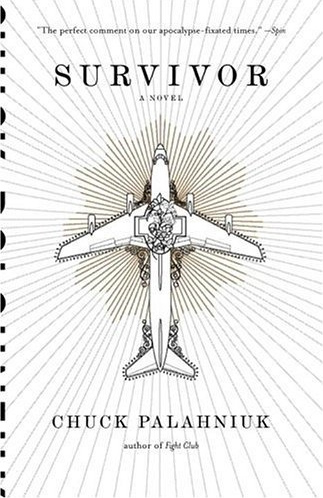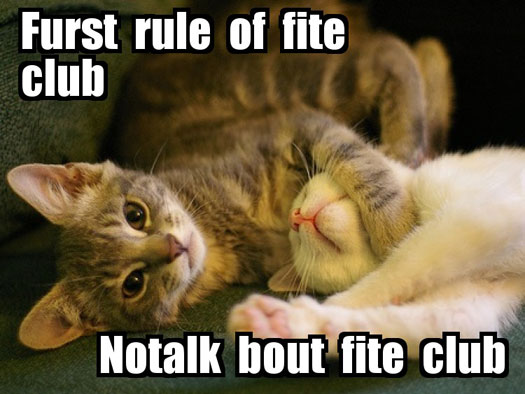on
'Survivor' and the infidelity of plot

I finished my first book by Chuck Palahniuk this weekend. You know Palahniuk. He wrote Fight Club. His fan club is called The Cult. He gives away weird souvenirs to everyone that asks a question at one of his readings. Fight Club is one of my all time favorite movies, but I’ve never read the book. I think the reason I’ve never read the book is because this college girl I met during a conference when I was 22 years old told me it was nothing like the movie. Since then, I’ve skipped them all as they came out. Great reason, right? Sometimes I make no sense. I know.
But I saw the guy speak while I was living in Madison and he came through for UW’s Distinguished Lecture Series. This guy was weird, I thought. I’ll read him one day. Now that I have, I think he might be one of my new favorite authors.
From last weekend, to this, I read Palahniuk. I finished my copy of his release from 2000, Survivor, as flummoxed as I began. The book is told by Tender Branson, the sole survivor of a weird cult that sorta like the Amish meet … Enron? The point is, Tender was supposed to live a life of toil, earning money and sending it back to his religious community until he died. Only the first born son of each house (and one lucky girl picked for each of these) gets to stay in the community. Everyone else is sent out to earn money.
Only, everyone in the home community kills themselves one day. I’m not spoiling anything. This happens pretty early in the book. When Tender finds out, he’s supposed to kill himself too, only he doesn’t. When all the rest of the members of his faith do, he’s the last one left and a talent agent turns him into an international celebrity. This is all in the jacket copy (or pretty much). What I don’t think it says is that before he gets famous he meets Fertility Hollis, and Fertility Hollis can predict the future.
The reason I was flummoxed by the ending of the book is because of some things that Tender quotes Fertility as saying before he reaches the grand finale. Every assertion by Fertility is important in the book, because Fertility is never wrong.
That makes Fertility something that we call in writing circles “a cheat.” She makes advancing the plot really easy. How does Fertility find Branson during rare moments away from his entourage once he becomes famous? Easy, she knows everything. How does she know how to find the one person he’s really looking for? She knows everything. How is she able to walk away from him in the middle of nowhere and find him again when he’s hiding from everyone else? Weren’t you paying attention?
It’s okay, though. I like it. The thing is, for the story to work, Tender needs to become really famous and he needs to be able to run into Fertility anonymously from time to time, and Palahniuk could have constructed an elaborate scheme by which she’d been able to do this each time only that would present three problems:
- We’d have to read it.
- Without her ability, it would be hard to believe that Fertility would give Tender the time and energy.
- We’d have to read that junk, and it would slow down an otherwise page-turning story. No thanks.
The point was to put Tender through what he went through, give him a reason to get out of it (besides survivor’s guilt) and see what he does next. For him to get out, he needs a lot of help. A pretty girl who can see the future is a pretty neat solution. It’s a cheat but it’s a good one.
Remember that scene in Good Will Hunting when Robin Williams gets Matt Damon’s head straight pretty much by slamming him against the wall and yelling at him a little? A friend of mine really hated that scene because he said that making the mental adjustment that Damon’s character made at that point would have taken a lot more talk and a lot more therapy than one dramatic moment. Even with Robin Williams.
Sure, but would you have wanted to watch a movie with all that blah-ginger? Here’s what counts, by that point in the film we wanted to know whether or not Damon’s character had the frijoles to take a risk for love. Turns out he did, and that’s pretty nice. We believe it because of the love story that came before. We don’t need to watch the whole process. The director gave us that moment as a sort of symbol for the process, to stand in for it.
And that’s pretty much how I feel about Fertility Hollis in Survivor. I think she’s a cheat but she’s a strategic cheat. She’s a good way to get Tender into the position Palahniuk wants to put him in, and Vonnegut says that’s why we read fiction: to see what characters we’ve come to care about do in impossible situations.
The book is not unflawed. For example, I think Tender Branson, the main character, becomes progressively more innocent and guiless as the book moves forward, which is a strange progression for a character (strange as in: people don’t do that). Tender has one pretty messed up hobby at the book’s beginning (loved it). I won’t ruin it for you, but I will say that’s hard to believe that the Tender Branson talking to you through the last half of the book could ever do any of the things he’s doing in the first half.
Still, I liked it. I really liked it. How could I not? It’s about a lonely man, a cult and lots and lots of suicides – three of my all time favorite literary themes. It’s driven by two absolutely distinct characters (imagine a movie with Jimmy Stewart and Sharon Stone and you sort of get the idea), the pop culture us literary types love to hate and a plane that’s going to crash into the Australian desert.
Fun for the whole family!
